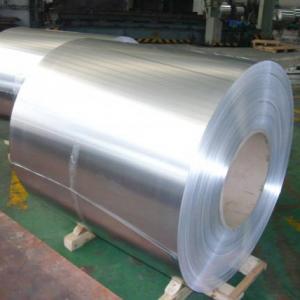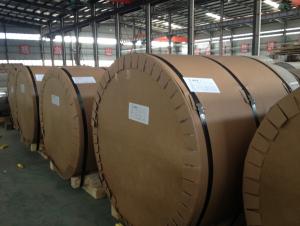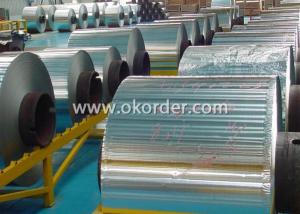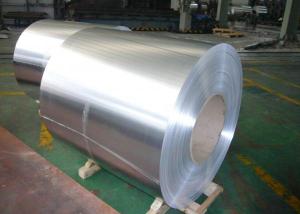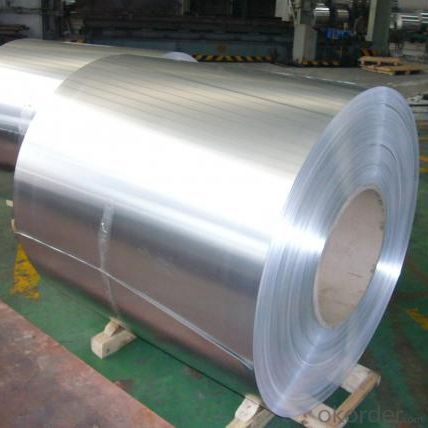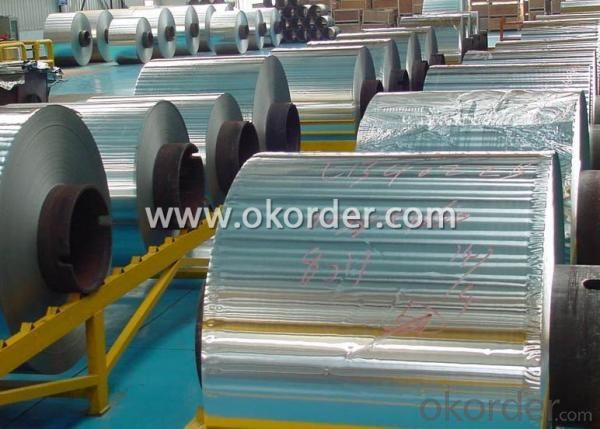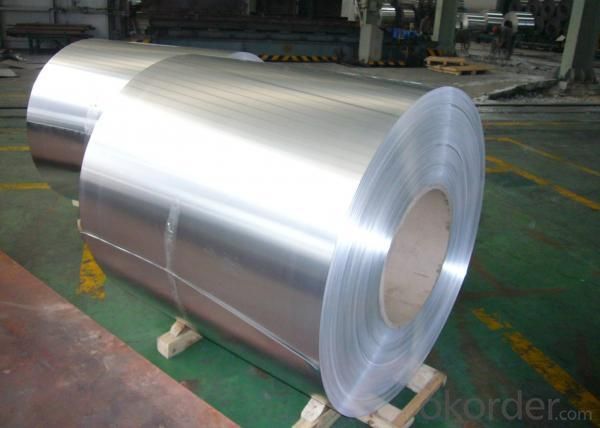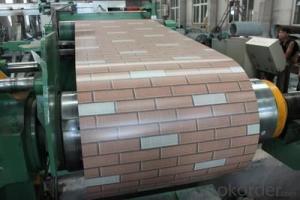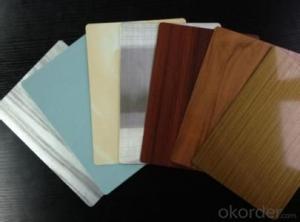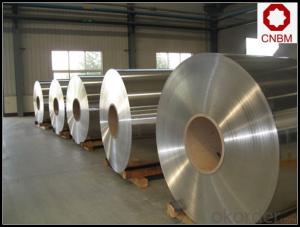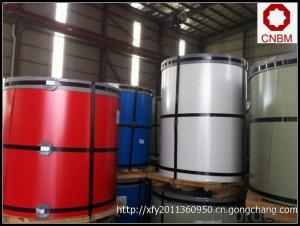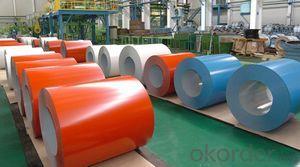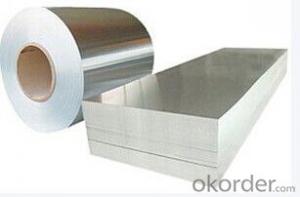Aluminum Coil Lowes 3105 Aluminium Coils Products
- Loading Port:
- China main port
- Payment Terms:
- TT or L/C
- Min Order Qty:
- 3000 m.t.
- Supply Capability:
- 10000 m.t./month
OKorder Service Pledge
OKorder Financial Service
You Might Also Like
1. Specifications of 3105 Aluminium Coils
Alloy | AA3105 |
Temper: | H12, H14, H16, H18, H22, H24, H26, H32,HO, F |
Thickness: | 0.10-500mm |
Width: | 10mm- 2200mm |
Standard: | GB/T3880-2006, ASTM, ISO, EU standard |
Special Specification is available on customer’s requirement | |
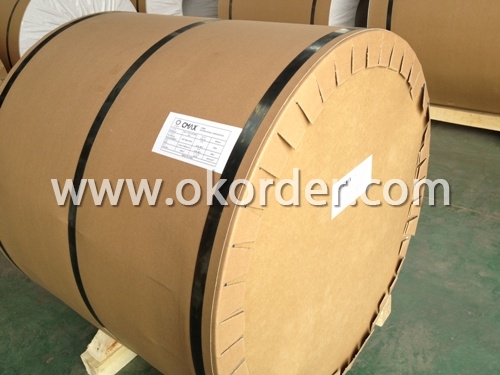
2. Applications of 3105 Aluminium Coils
3105 Aluminium Coils are of high plasticity, hard in corrosion, good at electrical and thermal conductivity.
3105 Aluminium Coils are widely used in air conditioner, aluminium composite panel, aluminium ceiling, road traffic sign, decoration, cover material, piping, refrigeration, automobile, etc.
3. Package & Delivery of 3105 Aluminium Coils
Seaworthy package, water-proof paper wrapped inside, carton wrapped outside in wooden pallets by 20FCL or 40GP.
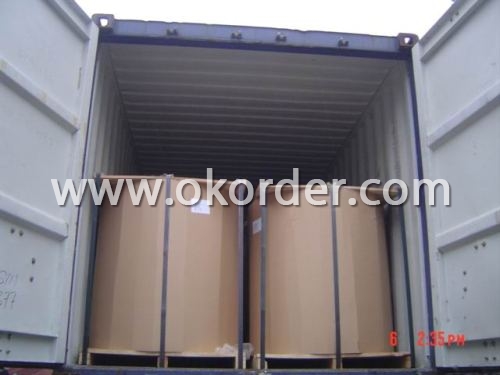
4. Production Flow of 3105 Aluminium Coils
The main producingprocedure includes the following steps:
Rolling--Annealing--Slitting--Sawing, Cut-To-Length, Shearing
New research shows that the future of automotive aluminum sheet demand will grow at an unprecedented rate. 2014 and 2015 is considered to be an turning point that steering the automotive industry from the traditional steel to other lightweight materials and aluminum sheet, including the use of aluminum sheet instead of advanced high strength steels (AHSS).
Promote energy saving in the global situation, the lightweight technology of the automobile industry brought to the agenda. Automobile cover of aluminum alloy sheet is a simple and effective way to reduce the weight. Automotive aluminum sheet high-end aluminum species in one, because of its performance (shaping, connections, etc.) and surface quality of the stringent requirements, but also to the processing of raw materials made finer control management requirements.
Overall, the use of aluminum sheet and other lightweight materials will become a significant feature of heavy vehicles, such as pickup, SUV and so on. The AHSS is likely to continue in light vehicles in use, this can reduce the body weight of about 100 kg.
The use of aluminum sheet in automobiles processing of raw materials and production processes impact on the environment, but in the use phase will reduce the environmental impact. The most critical thing is that the entire life cycle of the cars with the use of aluminum will reduce the impact of environment. Thus, in the automotive industry, using aluminum sheet instead of steel will continue be the develop trend.
2012--2015 years, the North American light vehicle aluminum consumption grew by 28% (growth of automobile production and the growth of the aluminum material content). 2025, pickup body portion 75% of the train will be composed of aluminum material, large cars 24%, SUV22%, 18% other small vehicles.
The popularity of the automobile industry is the development and application of energy, environmental protection and safety of these three issues are closely related. Although the car as a symbol of modernization and social development, social progress and brought prosperity, but also brought energy, environmental protection, transportation, land and other issues. Undoubtedly, these require the auto industry itself and related industries to explore joint research to be resolved.
Most of the domestic automobile industry, aluminum production companies do not have the background and related technology base, still in imitation stage abroad, the theoretical mechanism and technically at a disadvantage.
North American and European automotive aluminum content will be the highest, in addition to Asia (especially China) is still the largest market for lightweight vehicles.
- Q: How are aluminum coils tested for dimensional accuracy?
- Aluminum coils are tested for dimensional accuracy through various methods to ensure that they meet the required specifications. One common method is the use of specialized equipment such as calipers, micrometers, and digital measuring devices. These tools are used to measure the dimensions of the coils, including their width, thickness, and length, with high precision. During the testing process, a sample coil is selected and measured at different points along its length to check for any variations or deviations from the specified dimensions. This helps to identify any potential issues with the coil's dimensional accuracy. In addition to manual measurements, advanced technologies such as laser scanning systems and optical sensors are also utilized. These technologies provide non-contact measurements, allowing for faster and more accurate assessments of the coil's dimensions. Laser scanners create a digital representation of the coil's surface, which can be compared to the desired specifications to determine if any deviations exist. Furthermore, computerized systems are employed to analyze the collected data and generate detailed reports. These reports provide comprehensive information regarding the coil's dimensional accuracy, highlighting any discrepancies from the required standards. This data analysis enables manufacturers to identify and address any potential problems promptly. Overall, aluminum coils undergo stringent testing procedures to ensure their dimensional accuracy. The combination of manual measurements, advanced technologies, and computerized analysis provides a thorough assessment of the coils' dimensions, allowing manufacturers to maintain high-quality standards and deliver products that meet the precise specifications demanded by various industries.
- Q: What should pay attention to transporting aluminum coil?
- You must ensure the good property of the aluminum coil.
- Q: What is the typical hardness of aluminum coils?
- The hardness of aluminum coils can vary depending on different factors, such as the composition of the alloy, the process of tempering, and the intended use. Manufacturers produce aluminum coils with different levels of hardness to meet various needs and requirements. Aluminum coils are available in different tempers, including soft, half-hard, and full-hard. Soft aluminum coils have low hardness and are highly malleable, making them suitable for applications that require easy shaping, such as packaging and wrapping materials. Half-hard aluminum coils are moderately hardened and offer a balance between formability and strength, making them suitable for applications like roofing and siding. Full-hard aluminum coils have the highest hardness and provide excellent strength, making them ideal for applications that require structural integrity, such as automotive parts and construction materials. To determine the specific hardness of aluminum coils, various testing methods can be used, such as Rockwell hardness, Vickers hardness, or Brinell hardness. These tests measure the resistance of the aluminum surface to indentation and provide a numerical value indicating the material's hardness. However, it is important to consult the manufacturer or supplier for the specific hardness values, as they can vary depending on the specific alloy and temper of the aluminum coil.
- Q: What are the different mechanical properties of aluminum coils?
- The different mechanical properties of aluminum coils include high strength, excellent formability, good corrosion resistance, and low density.
- Q: Can aluminum coils be used in HVAC heat exchangers?
- Yes, aluminum coils can be used in HVAC heat exchangers. Aluminum is a commonly used material in heat exchangers due to its excellent thermal conductivity, lightweight nature, and resistance to corrosion. It allows for efficient heat transfer and is often preferred over other materials like copper in certain HVAC applications.
- Q: Hi, I have a large bag of aluminium sulfate that I would like to use to turn my hydrangeas blue but there are no instructions on the pack, can anyone tell me how much I need (mixed with water)
- I usually sprinkle about 1/4 cup around the base of the plant and water it in. This must be done before flowers appear.
- Q: Are there any environmental considerations when using aluminum coils?
- Yes, there are several environmental considerations when using aluminum coils. Firstly, the production of aluminum coils requires mining and extraction of bauxite, which can lead to habitat destruction and biodiversity loss. Additionally, the extraction and refining processes consume significant amounts of energy, contributing to greenhouse gas emissions. However, aluminum is highly recyclable, and using recycled aluminum reduces the environmental impact by saving energy and reducing waste. Proper disposal and recycling of aluminum coils are crucial to minimize environmental harm.
- Q: How do aluminum coils contribute to sustainable manufacturing?
- There are several ways in which aluminum coils significantly contribute to sustainable manufacturing. To begin with, aluminum is a highly recyclable material, and the use of aluminum coils helps establish a closed-loop recycling system. These coils can be easily melted and reused without losing their original properties, reducing the need for new raw materials and minimizing the environmental impact of mining and extraction. Moreover, the lightweight nature of aluminum coils plays a crucial role in reducing energy consumption during transportation. This lightness makes them more fuel-efficient to transport, resulting in lower greenhouse gas emissions. Consequently, this not only reduces the carbon footprint but also saves costs associated with transportation. Furthermore, aluminum possesses excellent corrosion resistance properties, rendering it durable and long-lasting. This durability reduces the frequency of replacements, leading to less waste generation. Additionally, it extends the lifespan of products utilizing aluminum coils, ultimately reducing overall resource consumption and lessening environmental strain. Additionally, the utilization of aluminum coils in manufacturing processes promotes energy efficiency. Aluminum's high thermal conductivity allows for efficient heat transfer and dissipation during various manufacturing operations, resulting in reduced energy consumption. This energy efficiency leads to lower energy costs and diminished greenhouse gas emissions. Lastly, aluminum is non-toxic and does not release harmful substances throughout its lifecycle. This ensures the safety of workers, consumers, and the environment. The absence of toxic materials also simplifies the recycling process, making it easier and more environmentally friendly. In conclusion, aluminum coils contribute to sustainable manufacturing through their recyclability, lightweight nature, durability, energy efficiency, and non-toxic properties. By incorporating aluminum coils into manufacturing processes, companies can reduce their environmental impact, conserve resources, and promote a more sustainable future.
- Q: Are aluminum coils suitable for high-pressure applications?
- Aluminum coils are generally not suitable for high-pressure applications. While aluminum is a lightweight and corrosion-resistant material, it has relatively low strength compared to other metals such as steel or copper. This lack of strength makes aluminum coils prone to deformation or failure under high pressure. In high-pressure applications, where the system experiences significant stress and requires robust materials, it is more common to use materials like copper or stainless steel, which have higher strength and can better withstand the pressure. However, it is essential to consult industry standards, guidelines, and specific requirements to determine the most appropriate material for a given high-pressure application.
- Q: Are aluminum coils suitable for thermal insulation?
- No, aluminum coils are not suitable for thermal insulation.
1. Manufacturer Overview
| Location | Henan,China |
| Year Established | 2002 |
| Annual Output Value | Above US$200 Million |
| Main Markets | Mid East;Eastern Europe;North America |
| Company Certifications | ISO 9001:2000;ISO 14001:2004;OHSAS 18001 |
2. Manufacturer Certificates
| a) Certification Name | |
| Range | |
| Reference | |
| Validity Period |
3. Manufacturer Capability
| a) Trade Capacity | |
| Nearest Port | Shanghai |
| Export Percentage | 30%-50% |
| No.of Employees in Trade Department | 21-50 People |
| Language Spoken: | English;Chinese |
| b) Factory Information | |
| Factory Size: | Above 100,000 square meters |
| No. of Production Lines | Above 10 |
| Contract Manufacturing | OEM Service Offered;Design Service Offered |
| Product Price Range | Average |
Send your message to us
Aluminum Coil Lowes 3105 Aluminium Coils Products
- Loading Port:
- China main port
- Payment Terms:
- TT or L/C
- Min Order Qty:
- 3000 m.t.
- Supply Capability:
- 10000 m.t./month
OKorder Service Pledge
OKorder Financial Service
Similar products
Hot products
Hot Searches
Related keywords
